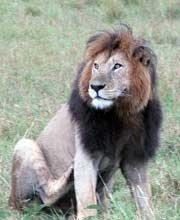Hunting Practices: Male Lions Are From Mars, Lionesses Are From Venus
They stand on mountains and look down on their subjects in Disney films and appear to laze around in the shade in those National Geographic videos while the females chase down the slowest gazelle on the plains, but guess what? African male lions hunt. They just hunt differently than lionesses do.

“A team of researchers has discovered the male lions' secret: They are solitary predators who leap out of thick vegetation to ambush their prey. That's in contrast to the well known social hunting behaviors of lionesses,” writes Larry O'Hanlon, in Discovery News.
Whereas lionesses tend to chase their prey on open plains, male lions kill in the tall grass. Scientists attached GPS collars to male lions that allowed for airborne Light Detection and Ranging measurements, which provided 3-D maps of landscape and habitat vegetation. That's where researchers discovered the difference in hunting techniques between genders. Males prefer thick vegetation. When groups of lions congregated in tall grassy areas, it meant a kill had taken place – by a male. Researchers could move in and analyze the follow-up to the feast. They did their CSI on the "King of the Forest" and all that.
The best thing about this knowledge is that like in this country, since biologists and ecologists manage habitat by choosing vegetation, thickness will now be a factor in that management plan. For a continent such as Africa, that could make a big difference in its conservation techniques and in tourism dollar results.







